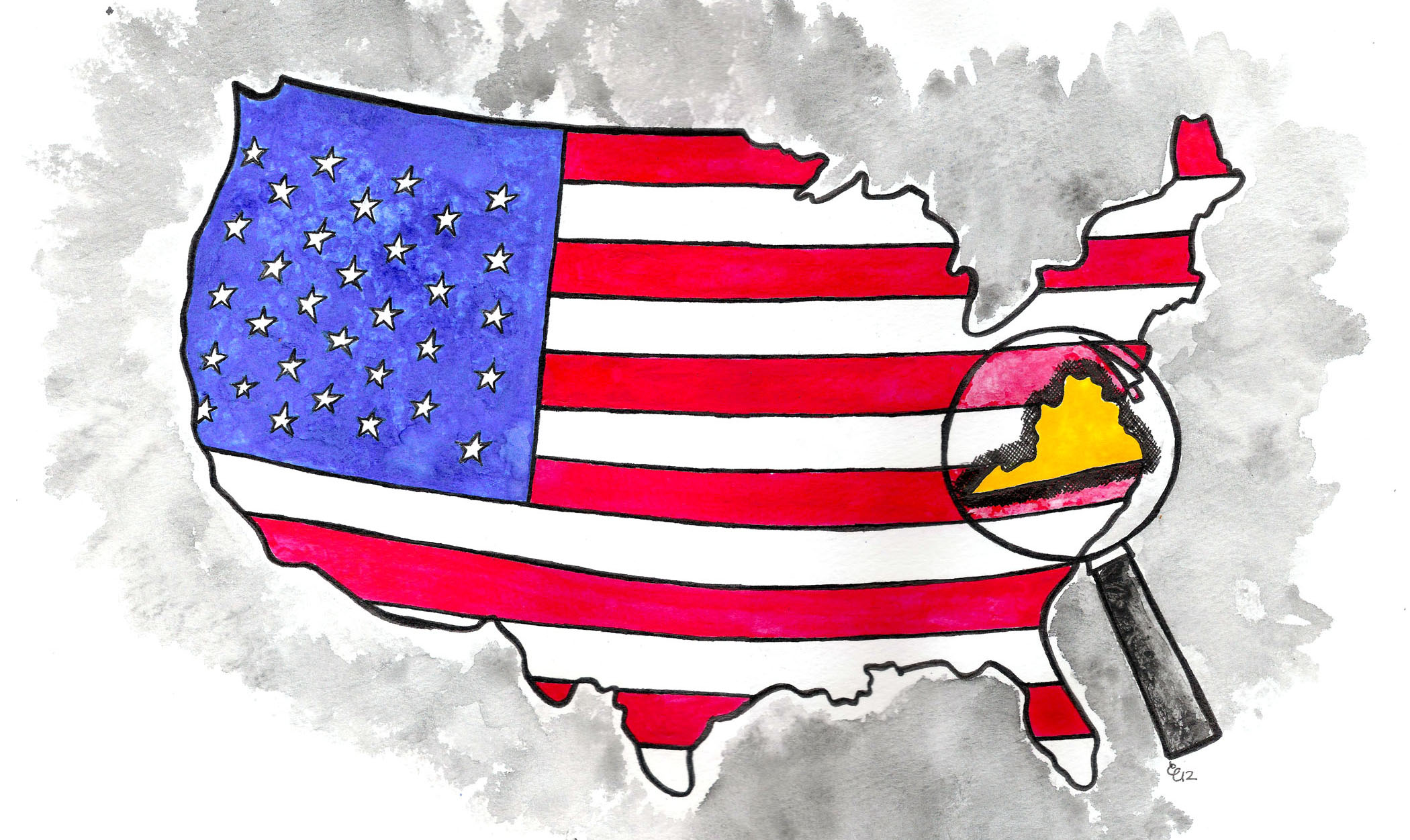RC Poll: Warner maintains large lead in Senate race, Clinton edges possible 2016 Republican rivals
September 24, 2014

Virginia Democratic Senator Mark Warner holds a comfortable 19-point lead over Republican challenger Ed Gillespie (46%-27%), according to the Roanoke College Poll. Libertarian Robert Sarvis polled at 5 percent.[1] In the generic Congressional ballot, Democrats hold an insignificant lead over Republicans (42%-38%). In an early look at possible 2016 Presidential match-ups, Hillary Clinton holds significant leads over possible Republican opponents Chris Christie (47%-37%), Rand Paul (51%-35%), and Paul Ryan (50%-37%). The Roanoke College Poll interviewed 630 likely voters in Virginia between September 13 and September 19 and has a margin of error of +3.9 percent.
These results are similar to the July Roanoke College Poll, although the Warner lead has shrunk slightly from the 25-point margin he enjoyed. Clinton has widened her lead over both Paul and Ryan, but the Christie margin is unchanged. The July RC Poll included registered voters, but did not screen for likely voters, so the results may not be directly comparable.
Attitudes toward the candidates
With the campaign in full swing, we asked likely voters how they see the candidates. Warner enjoys the highest favorable ratings of any statewide elected official at 58 percent. Gillespie has climbed to a 20 percent rating, but 52 percent still do not know enough about him to have an opinion. Sarvis' favorable rating is 11 percent, with three-fourths (75%) of likely voters not having an opinion.
Respondents were asked to agree or disagree with a series of statements that the candidates have used to describe themselves and their opponents. Voters in Virginia agree that Warner has been an effective leader who has done what is best for Virginia (55%) and is someone who works with both Democrats and Republicans to solve problems (62%). They do not see him as a rubber stamp for President Barack Obama (24%) or as a person who does what is best for the Democratic Party or the president rather than what is best for Virginia (31%). Gillespie is more likely to be viewed as someone who would represent the interests of Virginia, not Washington (28% agree, 19% disagree), but opinion is split regarding whether he would represent special interests and lobbyists over Virginia (24% agree, 24% disagree). Sarvis is seen as perhaps bringing a fresh perspective to governing (18%), but also as someone with too little experience whose views are too far outside the mainstream (21%). For Gillespie, nearly half of voters do not know enough about him to make those judgments. Close to 60 percent of voters said they do not know enough about Sarvis to have an opinion.
Warner leads Gillespie and Sarvis among liberals (80%-4%-5%) and moderates (54%-17%-6%) as well as Democrats (87%-1%-3%). He is tied with Gillespie among Independents (32%-32%-10%). Gillespie leads Warner and Sarvis among conservatives (22%-53%-4%) and Republicans (10%-66%-0%), but Warner's showing in those groups is respectable.
As is typical, a plurality of respondents named an economic issue as the most important problem facing the country (22% economy; 10% unemployment or jobs; and 7% the budget or taxes). Given current events, it is not surprising that 16 percent named foreign policy, ISIS, or terrorism as most important. Health care (7%), immigration (5%), and leadership/gridlock (7%) are also areas of concern for Virginians.
Analysis
"Gillespie's numbers are finally beginning to move, but at a very slow pace. Meanwhile his attacks on Warner appear to be ineffective," said Dr. Harry Wilson, director of the Institute for Policy and Opinion Research. "While Warner may not be quite at the 'magical' 50 percent in the vote question, his favorable rating is well above that mark. Voters tend to see him as a bipartisan problem-solver who does what is best for Virginia. This is clearly his election to lose."
Methodology
Interviewing for The Roanoke College Poll was conducted by The Institute for Policy and Opinion Research at Roanoke College in Salem, Va. between September 13 and September 19, 2014. A total of 630 likely voters in Virginia were interviewed. The sample included both land lines and cell phones and was created so that all cell phone and residential telephone numbers, including unlisted numbers, had a known chance of inclusion. Cell phones constituted 31 percent of the completed interviews.
Questions answered by the entire sample of 630 likely voters are subject to a sampling error of plus or minus approximately 3.9 percent at the 95 percent level of confidence. This means that in 95 out of 100 samples like the one used here, the results obtained should be no more than 3.9 percentage points above or below the figure that would be obtained by interviewing all likely voters in Virginia who have a home telephone or a cell phone. The margin of error is larger for any subsets of the 630 total.
Quotas were used to ensure that different regions of the Commonwealth were proportionately represented. The data was statistically weighted for gender, race, and age using the 2013 state exit poll as a benchmark. IPOR does not weight for political party.
A copy of the topline questionnaire and all frequencies may be found here.
[1] Including those who are "leaning" toward a candidate, the results are: Warner-49%, Gillespie-29%, Sarvis-6%, and 16% undecided. Employing a stricter likely voter "screen" narrows Warner's lead minimally. Looking only at those who said they are likely to vote in 2014 and who voted in 2012 and 2013, the margin for Warner over Gillespie and Sarvis is 49%-31%-5% (N=444). Including those who are "leaning" in each candidate's support among strictly screened voters results in totals of 51%-33%-6%, with 10% still undecided.
Released: September 24, 2014
Contact Name: Dr. Harry Wilson
Contact Phone: (540) 375-2415 (office)
Contact Email: wilson@roanoke.edu